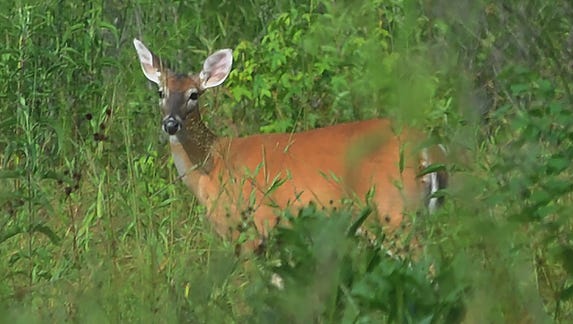Please E-mail suggested additions, comments and/or corrections to Kent@MoreLaw.Com.
Help support the publication of case reports on MoreLaw
Date: 09-13-2016
Case Style:

Case Number: 2:16-cr-00002-KS-MTP
Judge: Keith Starrett
Court: United States District Court for the Southern District of Mississippi (Forrest County)
Plaintiff's Attorney: Darren LaMarca
Defendant's Attorney:

Doug Montague, III for Coleman Virgil Slade

Joe Hollomon for Dewayne Slade
Description: Hattiesburg, MS - Three Plead Guilty to Importing White-Tailed Deer in Mississippi
Coleman Virgil Slade, 70, of Purvis, Mississippi, Don Durrett, 72, of Aspermont, Texas, and Dewayne Slade, 44, of Purvis, Mississippi, pled guilty on August 31, 2016, to conspiracy to violate the Lacey Act by importing live white-tailed deer into Mississippi.
Coleman Virgil Slade pled guilty to a felony conspiracy count and faces a maximum penalty of five years in prison and a $250,000 fine.
Don Durrett and Dewayne Slade pled guilty to a misdemeanor conspiracy count and were each sentenced to a $10,000 fine, placed on three years of probation, and prohibited from hunting for one year.
According to the guilty pleas, from January of 2009 through December of 2012, the Slades and Durrett spent over $100,000 to purchase live white-tailed deer for delivery from Texas to Mississippi. It is illegal to import live white-tailed deer into Mississippi. However, the deer were transported to Lamar County, Mississippi, and placed in a high fence enclosure. The purchases and transportation to Mississippi of the live white-tailed deer were accomplished through false purchase and transportation records.
“The Department of Justice is committed to enforcing the Lacey Act and other federal laws to protect our wildlife resources,” said U.S. Attorney Gregory K. Davis. “We will continue to work closely with USDA OIG, U.S. Fish and Wildlife Service and the Mississippi Department of Wildlife, Fisheries and Parks to enforce the Lacey Act.”
U.S. Fish and Wildlife Service Special Agent in Charge Luis Santiago stated “We take our mission working with the Mississippi Department of Wildlife, Fisheries, and Parks and the citizens of Mississippi in conserving, protecting, and enhancing fish, wildlife, plants and their habitats very seriously. We will continue working vigorously investigating those who choose to violate state and federal laws.”
“I want to thank the US Attorney’s office, OIG special agents, and our law enforcement partners for their hard work on this investigation,” said USDA OIG Special Agent in Charge Dax Roberson, “USDA OIG is committed to pursuing individuals who commit criminal violations of the Lacey Act, which is intended to protect the health and well-being of America’s wildlife.”
This case was investigated by the U.S. Fish and Wildlife Service - Office of Law Enforcement, the U.S. Department of Agriculture – Office of Inspector General, and the Mississippi Department of Wildlife, Fisheries, and Parks.
Title 16 U.S.C. 3371 provides:
(a) The term “fish or wildlife” means any wild animal, whether alive or dead, including without limitation any wild mammal, bird, reptile, amphibian, fish, mollusk, crustacean, arthropod, coelenterate, or other invertebrate, whether or not bred, hatched, or born in captivity, and includes any part, product, egg, or offspring thereof.
(b) The term “import” means to land on, bring into, or introduce into, any place subject to the jurisdiction of the United States, whether or not such landing, bringing, or introduction constitutes an importation within the meaning of the customs laws of the United States.
(c) The term “Indian tribal law” means any regulation of, or other rule of conduct enforceable by, any Indian tribe, band, or group but only to the extent that the regulation or rule applies within Indian country as defined in section 1151 of title 18.
(d) The terms “law,” “treaty,” “regulation,” and “Indian tribal law” mean laws, treaties, regulations or Indian tribal laws which regulate the taking, possession, importation, exportation, transportation, or sale of fish or wildlife or plants.
(e) The term “person” includes any individual, partnership, association, corporation, trust, or any officer, employee, agent, department, or instrumentality of the Federal Government or of any State or political subdivision thereof, or any other entity subject to the jurisdiction of the United States.
(f) Plant.—
(1)In general.—
The terms “plant” and “plants” mean any wild member of the plant kingdom, including roots, seeds, parts, or products thereof, and including trees from either natural or planted forest stands.
(2)Exclusions.—The terms “plant” and “plants” exclude—
(A) common cultivars, except trees, and common food crops (including roots, seeds, parts, or products thereof);
(B) a scientific specimen of plant genetic material (including roots, seeds, germplasm, parts, or products thereof) that is to be used only for laboratory or field research; and
(C) any plant that is to remain planted or to be planted or replanted.
(3)Exceptions to application of exclusions.—The exclusions made by subparagraphs (B) and (C) of paragraph (2) do not apply if the plant is listed—
(A) in an appendix to the Convention on International Trade in Endangered Species of Wild Fauna and Flora (27 UST 1087; TIAS 8249);
(B) as an endangered or threatened species under the Endangered Species Act of 1973 (16 U.S.C. 1531 et seq.); or
(C) pursuant to any State law that provides for the conservation of species that are indigenous to the State and are threatened with extinction.
(g)Prohibited Wildlife Species.—
The term “prohibited wildlife species” means any live species of lion, tiger, leopard, cheetah, jaguar, or cougar or any hybrid of such species.
(h) The term “Secretary” means, except as otherwise provided in this chapter, the Secretary of the Interior or the Secretary of Commerce, as program responsibilities are vested pursuant to the provisions of Reorganization Plan Numbered 4 of 1970 (84 Stat. 2090); except that with respect to the provisions of this chapter which pertain to the importation or exportation of plants, the term also means the Secretary of Agriculture.
(i) The term “State” means any of the several States, the District of Columbia, the Commonwealth of Puerto Rico, the Virgin Islands, Guam, Northern Mariana Islands, American Samoa, and any other territory, commonwealth, or possession of the United States.
(j) Taken and Taking.—
(1)Taken.—
The term “taken” means captured, killed, or collected and, with respect to a plant, also means harvested, cut, logged, or removed.
(2)Taking.—
The term “taking” means the act by which fish, wildlife, or plants are taken.
(k) The term “transport” means to move, convey, carry, or ship by any means, or to deliver or receive for the purpose of movement, conveyance, carriage, or shipment.
Outcome: Guilty
Plaintiff's Experts:
Defendant's Experts:
Comments: